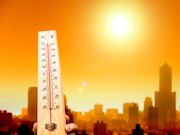Factors that could increase risk include age-related changes to skin; heart, lung, and kidney diseases
THURSDAY, July 5, 2018 (HealthDay News) — Older adults are at significantly increased risk of heat-related illnesses, which can include heat stroke, heat edema, heat syncope, heat cramps, and heat exhaustion, according to the National Institutes of Health.
Factors that could increase risk include age-related changes to the skin such as poor blood circulation and inefficient sweat glands; heart, lung, and kidney diseases as well as other illnesses; high blood pressure and other conditions necessitating a change in diet; reduced sweating, caused by medications such as diuretics, sedatives, and tranquilizers; polypharmacy; being very overweight or underweight; drinking alcoholic beverages; and being dehydrated. Risk can also be increased in association with lifestyle factors.
On particularly hot and humid days, older people, especially those at increased risk, should stay indoors, particularly if there is an air pollution alert in effect. Plenty of fluids should be drunk and light-colored, loose-fitting clothes should be worn. Homes should be kept cool or people should go somewhere cool.
“Heat stroke is a severe form of hyperthermia that occurs when the body is overwhelmed by heat and unable to control its temperature,” according to the National Institutes of Health. “Symptoms include fainting; a change in behavior (confusion, combativeness, staggering, possible delirium or coma); dry, flushed skin and a strong, rapid pulse; and lack of sweating. Seek immediate medical attention for a person with any of these symptoms, especially an older adult.”
Copyright © 2018 HealthDay. All rights reserved.








